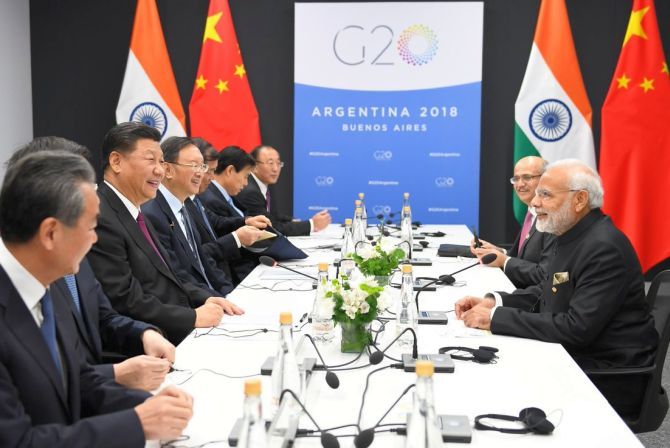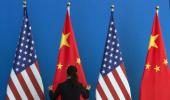'The reason why we don't have an escalation of war like in 1962 is because in 1962, we didn't have this connectivity.'
'Whereas today, we have lots of incentives to stay stable and connected to China even though we still have that political rivalry.'

Chinese Foreign Minister Wang Yi, left, will visit New Delhi for talks with Indian leaders between December 21 and 24. Photograph: Photograph: @MEAIndia/Twitter
Prime Minister Narendra Damodardas Modi has said this at several forums, that the '21st century belongs to Asia'.
However, it is hard to imagine Asia as a whole, given the multiple rivalries between its nations and presence of several blocs of nations whose interests sometimes clash. Like India and China's does many times.
To explain how the 21st century is the 'Asian Century', global strategy advisor Parag Khanna has written a new book The Future is Asian, which will be launched next year.
Khanna was in Mumbai earlier this month for a preview of his book and to deliver a TEDx talk on the subject.
"It's a very healthy and balanced way to approach the India-China relationship; to view it not as one-dimensional (like) territory as if nothing else matters. Rather to be multi-dimensional; it's economic, it's territory, it's diplomacy, it's culture, it's infrastructure, it's many things," Khanna tells Rediff.com's Utkarsh Mishra. Part 1 of the interview:
Why do you think 21st century will be an 'Asian Century'? And will it be all of Asia or dominated by some countries like China?
First of all it already is, because we are already in the 21st century. It's not a future prognosis. It's today's reality. It's becoming more and more true every day.
Asia is five billion people, so it's the majority of the world population and always will be the majority.
Secondly, it's 40 per cent of the world economy. So it's bigger than Europe, it's bigger than America -- already today, not 20 years from now, but today.
So we're already in the 'Asian Century', we just don't know it yet, in many ways. Because we don't think of Asia as a concrete thing.
We think of China, we think of Japan, we think of India, we don't think of them together as having anything in common.
The truth is that Asia has more in common with Asia than rest of the world.
But for the past 500 years, because of colonialism and the Cold War, Asians have thought more about the other places of the world rather than itself.
But that has changed a lot in exactly the last 20 years.
So in my work, I show how Asians already trade more with other Asians than they do with anyone else. They buy more resources from each other. They travel more to each other's countries than anywhere else.
So what is happening is there is a reality and there is psychology, and the psychology lags behind the reality. The psychology lags behind the reality in Asia itself, let alone the rest of the world.
If Asians themselves don't realise how Asian the world is, how do you expect the Americans and the Europeans to realise how Asian the world is?
So that's part of the kind of motivation for me in terms of the new book that I've written is to send this message very, very clearly. And to kind of put the marker on the ground that it is not the Chinese century, it is the Asian century.
And Asia is something that is greater than the sum of its part. People think of Asia in just parts -- the China part, the Japan part, the India part -- that they are rivals, they hate each other, they are disconnected from each other. Not true, right?
There is rivalry, but there is already a whole that is greater than the sum of its parts.
But China has already taken a lead in the form of BRI and other projects. How are others going to catch up?
The BRI is something that China kicks off, and leads it. China has first-mover advantage in it. But everyone can win from it.
It is not an arms race in the sense of selling weapons to countries and buying their alliances. That is the traditional way of approaching geopolitics.
Belt and Road is building infrastructure and everyone gets to use it. It's not a missile system where I sell to you and I give only you the key.
I build you a road, and Iran can use the road, Russia can use the road, Saudi Arabia can use the road, India can use the road.
China builds a road in Afghanistan and Indian trucks are going to use it more than the Chinese trucks, right? So that's the way Belt and Road works.
People think of Belt and Road is something where China is going to dominate. But infrastructure is a different category of activity than weapons.
So I think what China is doing actually is a gift. Now everyone is suspicious of a gift from China; because everyone is suspicious of China, and you should be suspicious of China.
But that doesn't mean you can't use the gift.
And that's the way to look at it.
In a previous TED talk on your book Connectography, you said that Asian countries are 'more interested in each other's functional geography than their political geography'. But it is precisely because of 'political geography' that India has kept out of BRI. How do you see that?
I said that there's a competition between thinking of the world in terms of political geography versus functional geography. It's not that one disappears and ceases to exist.
It's that there are layers, and layer can create a tension with another layer.
So if you look at the world only in terms of China and India's territorial competition and rivalry, whether it's the Doklam plateau or the CPEC (China Pakistan Economic Corridor) project that runs through Kashmir, then you have a territorial view. And that's very valid, it's a very big problem.
But there's also a functional view that says we also have the Nathu La pass with China, we have growing trade with China, we're trading, you know, 60, 70 billion dollars each year and even more.
China is investing in our country, we are taking loans from the Asian Infrastructure Investment Bank which is based in China.
So the reason why we don't have an escalation of war like in 1962 is because in 1962, we didn't have this connectivity, we didn't have this functional geography, we had no incentives of connectivity.
Whereas today, we have lots of incentives to stay stable and connected to China even though we still have that political rivalry.
You see this in the way that the BRI is playing up. Of course, Modi boycotted the BRI Summit in 2017, but India is still taking money from the AIIB.
So it's doing both at the same time. And I think it's a very healthy and balanced way to approach the relationship; to view it not as one-dimensional (like) territory as if nothing else matters.
Rather to be multi-dimensional; it's economic, it's territory, it's diplomacy, it's culture, it's infrastructure, it's many things.










